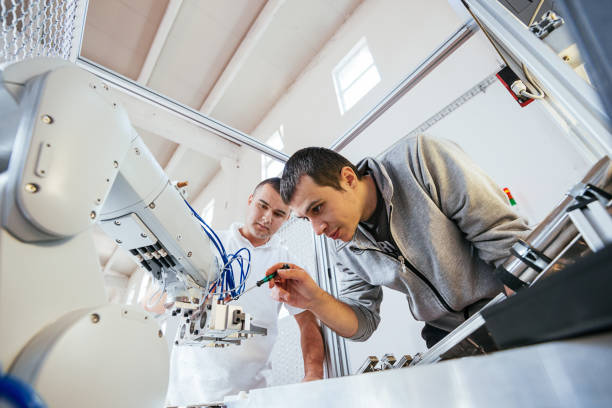Feeling overwhelmed with endless topics and uncertain where to start? You’re not alone. Robotics Engineer interview preparation can be challenging, but a clear, structured roadmap can help you tackle those pain points head-on and boost your confidence. Here’s an engaging guide to help you navigate your journey—from day one to interview day.
Overcoming Common Interview Prep Pain Points
- Topic Overload: With a myriad of subjects such as kinematics, control systems, sensor integration, robotics programming, and behavioral questions, it’s easy to feel lost.
- Lack of Structured Guidance: Without a clear plan, you might spend too much time on one area while neglecting others that are equally important.
- Time Management: Balancing preparation with ongoing projects and daily responsibilities can be stressful.
- Insufficient Real-World Practice: Simulating real robotics challenges is difficult without the right hands-on labs, projects, or case studies.
- Feedback Gaps: Limited constructive feedback may slow your progress and undermine your confidence.
Your 4-Week Preparation Roadmap
A dedicated, week-by-week plan can transform chaos into clarity. Here’s a suggested 4-week timeline that covers all the essential areas for Robotics Engineer interviews.
Week 1: Build Your Foundation
Focus: Core Robotics Concepts & Basic Programming
Daily Goals:
- Day 1-2: Review the fundamentals of robotics, including kinematics, dynamics, and the principles of mechanical design.
- Day 3-4: Brush up on basic programming skills relevant to robotics, such as C/C++ or Python, focusing on algorithms and data structures.
- Day 5: Study the basics of control systems and sensor integration—learn how sensors (e.g., LIDAR, cameras, IMUs) work and how they interface with robotic systems.
- Day 6: Engage in hands-on exercises or simulations using robotics development platforms (like ROS or V-REP) to implement simple tasks.
- Day 7: Reflect on your learnings and test your foundational knowledge using our Interview Question Generator.
Tip: Combine theoretical study with practical exercises to build a robust base in robotics fundamentals.
Week 2: Dive into Robotics Programming & Control Systems
Focus: Advanced Programming, Control Algorithms, & Integration Techniques
Daily Goals:
- Day 1-2: Study advanced robotics programming concepts, including real-time processing, multithreading, and hardware interfacing.
- Day 3: Deepen your understanding of control systems by reviewing PID controllers, state-space models, and adaptive control methods.
- Day 4: Practice implementing control algorithms in simulation environments, and tune parameters for optimal performance.
- Day 5: Work on coding challenges related to sensor data fusion and integration of multiple sensor inputs.
- Day 6: Engage in a mini-project where you build a simple robotic system that navigates an environment using sensor feedback.
- Day 7: Reflect on your progress and simulate technical questions focused on robotics programming and control systems using our Interview Question Generator.
Tip: Strengthen your technical skills through hands-on projects that simulate real-world control and integration challenges.
Week 3: Master Advanced Topics & System Design
Focus: Advanced Robotics, AI Integration, & Scalable System Design
Daily Goals:
- Day 1: Study advanced robotics topics such as machine vision, SLAM (Simultaneous Localization and Mapping), and robotic autonomy.
- Day 2: Explore the integration of artificial intelligence in robotics—review deep learning approaches for object recognition and decision-making.
- Day 3: Learn about robotic system design principles, including modularity, scalability, and fault tolerance.
- Day 4-5: Engage in whiteboard sessions to design end-to-end robotic systems, discussing trade-offs in sensor selection, control algorithms, and processing architectures.
- Day 6: Work on a mini-project or case study that challenges you to integrate advanced AI techniques into a robotic application.
- Day 7: Summarize your learnings and prepare a mock presentation on your approach to designing scalable and intelligent robotic systems.
Tip: Use whiteboard practice to clearly articulate your design decisions and discuss the trade-offs in building complex robotic systems.
Week 4: Polish Your Behavioral & Soft Skills
Focus: Behavioral Interviews, Portfolio Review, & Mock Sessions
Daily Goals:
- Day 1: Prepare your portfolio by reviewing past robotics projects, lab exercises, and case studies. Be ready to discuss your role, challenges faced, and solutions implemented.
- Day 2: Outline key experiences using the STAR method (Situation, Task, Action, Result) tailored to your robotics projects.
- Day 3: Record yourself answering common behavioral and technical questions to identify improvement areas.
- Day 4: Conduct mock interviews focusing on both technical scenarios and soft skills.
- Day 5: Seek constructive feedback from peers or mentors, and refine your responses.
- Day 6: Practice articulating your problem-solving process, your approach to system integration, and how you handle troubleshooting in robotics.
- Day 7: Reflect on your progress, relax, and boost your confidence with final rounds of mock sessions using our Interview Answer Generator.
Tip: Clear, confident communication of your technical expertise and collaborative approach is key to a successful interview.
Bringing It All Together
By following this roadmap, you’re not only addressing the common pain points of interview preparation but also ensuring that every aspect of your Robotics Engineer interview is covered. Remember:
- Break It Down: Tackle one component at a time—don’t try to master everything in one go.
- Stay Consistent: Even short, focused sessions add up over time.
- Use the Right Tools: Leverage interactive tools like our Interview Question and Interview Answer Generators to simulate real interview conditions and get valuable feedback.
- Believe in Yourself: Your passion for robotics, combined with structured preparation and practical experience, will set you apart.
Start your journey today, and turn every challenge into an opportunity for growth. With clear steps and the right mindset, your dream role as a Robotics Engineer is well within reach!
Happy prepping, and here’s to your success!




